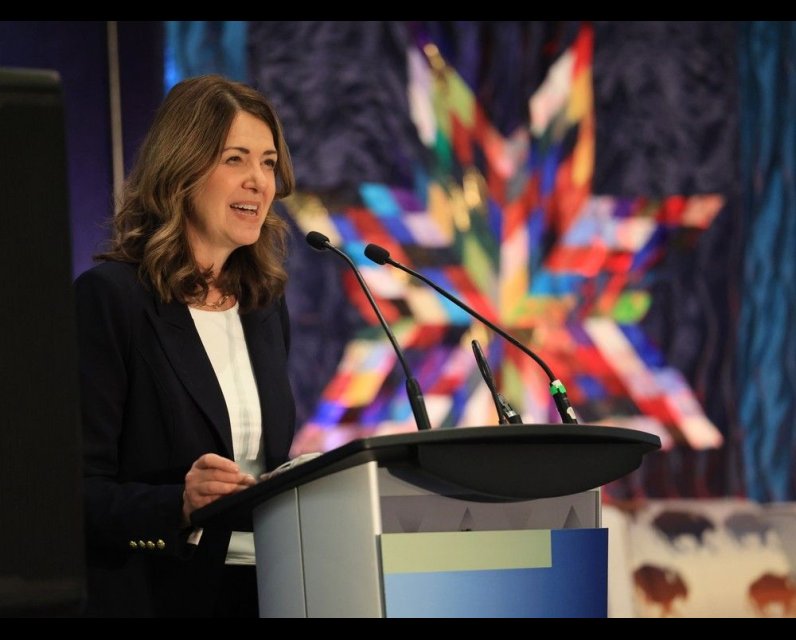Stay informed
Smith says future of industrial carbon tax should be at level 'industry can afford'

OTTAWA — Deciding how long it will take for Alberta’s industrial carbon tax to hit its new “minimum” of $130 per tonne should be based on what “industry can afford,” says Alberta Premier Danielle Smith.
Smith made the comments fresh off the signing of a new energy and pipeline deal with Prime Minister Mark Carney, which throws the Liberal government’s support behind the construction of a new Alberta-B.C. bitumen pipeline and exempts the province from a set of clean electricity regulations.
Chief among the wins the prime minister has touted from the deal is Alberta’s commitment to strengthening its industrial carbon tax, which Smith had earlier this year frozen at $95 per tonne. Under the current federal standard, systems must progressively hike the tax to reach $170 per tonne by 2030.
The new deal commits Ottawa and Alberta to collaborate on long-term carbon pricing for its oil and gas and electricity sectors through its provincial TIER system. According to the pact, both governments agreed that the system “will ramp up to a minimum effective credit price of $130/tonne.”
Asked what year Alberta intends to meet the price of $130 per tonne, Smith told National Post in an interview Thursday, “we have to negotiate that.”
She said there are partners the province must negotiate with, including a group of oilsands companies proposing to build a massive carbon capture and storage project, which Carney has linked to any future construction of a new bitumen pipeline, that Smith agreed to in the deal.
While industrial carbon pricing is part of that project, the premier said “they’re also on the other side, in wanting to expand production, and knowing that if it goes too high, it could put us in an uncompetitive position compared to the United States.”
“We’ve got to gauge that. We’ve got to see what is happening in the global market. We’ve got to see what’s reasonable.”
Asked whether the new “minimum” tax agreed to in the deal of $130 per tonne could be reached by 2030, Smith said that she was of the view that “it’s got to be at a level that the industry can afford.”
The next steps on Alberta’s carbon pricing policy will be the subject of another set of negotiations with Carney’s government, set to be concluded no later than next April.
“We wanted to send the signal that we’re open to having a discussion about what it should be, but that hasn’t been determined yet, how quickly it’s going to rise, or what the ultimate top price would be,” Smith said.
Industrial carbon pricing, which applies to heavy emitters, remains a cornerstone of Carney’s climate policy. His Nov. 4 budget promised to also develop a “post-2030 carbon pricing trajectory” by working with provinces and territories.
On the question of whether there was any scenario the premier would be willing to sign on to having that tax reach $170 per tonne, Smith said she did not want to “prejudge” future discussions or what the market may be out to 2050, which is when Canada and Alberta have agreed to achieve net-zero emissions.
“I think what we want to do is ensure that the price is at a level today that will stimulate some of the investment in emissions reduction technology without crushing the industry.”
She added: “I think you can see we all agree $170 by 2030, was too high, too fast, and I’m encouraged by the fact that they made that concession.”
Even with the major new energy deal in hand, Smith predicts no private sector proponent will come forward to build the pipeline proposal until approval is secured from the federal major projects office.
Under the pact, Smith committed to formally apply to that office, which Carney established this fall to help streamline the approvals process, no later than next July, slightly later than Alberta’s initially stated goal of next spring.
“I think we’d have to get approval from the major projects office to get a private sector proponent,” Smith said.
“So we’re prepared to take it through the first couple of stages. Because, let’s face it, our industry has been bitten before,” adding she believes any proponent needs a high level of approval certainty.
B.C. Premier David Eby has slammed the continued lack of a pipeline proponent when it comes to the federal backing of the project, saying it risks serving as a “distraction” from focusing on other major infrastructure projects that currently have private sector support and financing.
“There is not one private company that has stepped up to say, if you build it, we’ll buy it. If the approvals are in place, we’ll build it. Not one,” Eby said on Thursday.
Carney confirmed, while speaking with reporters that day, that without a private proposal, a new pipeline to the B.C. coast would not get built.
An Alberta official who spoke to reporters in a technical briefing before the deal was unveiled said that should the process ahead roll out smoothly, the goal would be to get shovels in the ground for a new pipeline by 2029.
National Post
Our website is the place for the latest breaking news, exclusive scoops, longreads and provocative commentary. Please bookmark nationalpost.com and sign up for our daily newsletter, Posted, here.


Comments
Be the first to comment